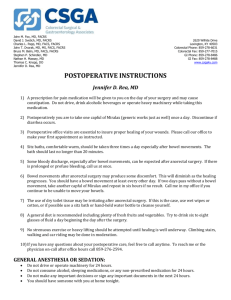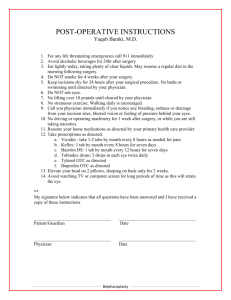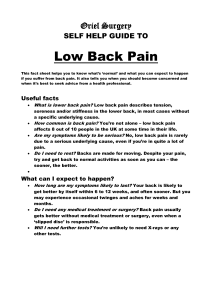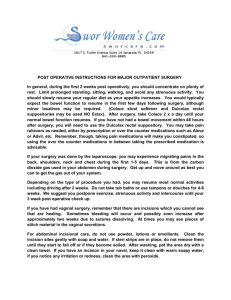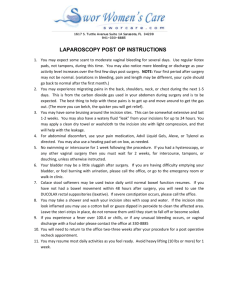Brigham Urogynecology Group - Brigham and Women`s Hospital
advertisement
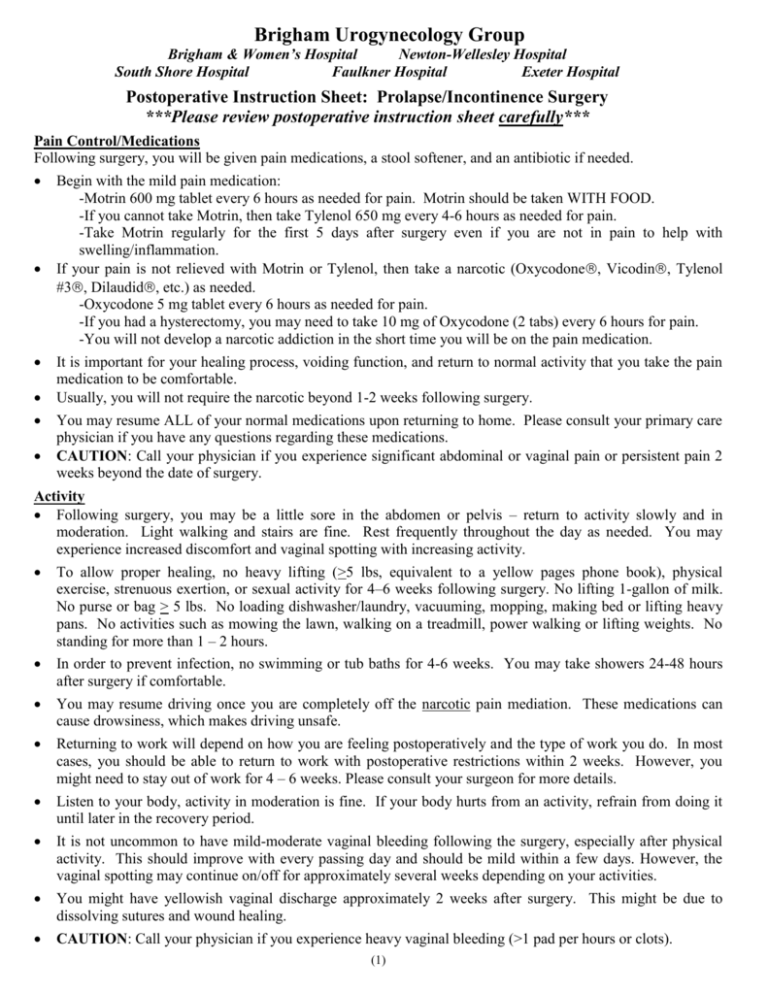
Brigham Urogynecology Group Brigham & Women’s Hospital Newton-Wellesley Hospital South Shore Hospital Faulkner Hospital Exeter Hospital Postoperative Instruction Sheet: Prolapse/Incontinence Surgery ***Please review postoperative instruction sheet carefully*** Pain Control/Medications Following surgery, you will be given pain medications, a stool softener, and an antibiotic if needed. Begin with the mild pain medication: -Motrin 600 mg tablet every 6 hours as needed for pain. Motrin should be taken WITH FOOD. -If you cannot take Motrin, then take Tylenol 650 mg every 4-6 hours as needed for pain. -Take Motrin regularly for the first 5 days after surgery even if you are not in pain to help with swelling/inflammation. If your pain is not relieved with Motrin or Tylenol, then take a narcotic (Oxycodone, Vicodin, Tylenol #3, Dilaudid, etc.) as needed. -Oxycodone 5 mg tablet every 6 hours as needed for pain. -If you had a hysterectomy, you may need to take 10 mg of Oxycodone (2 tabs) every 6 hours for pain. -You will not develop a narcotic addiction in the short time you will be on the pain medication. It is important for your healing process, voiding function, and return to normal activity that you take the pain medication to be comfortable. Usually, you will not require the narcotic beyond 1-2 weeks following surgery. You may resume ALL of your normal medications upon returning to home. Please consult your primary care physician if you have any questions regarding these medications. CAUTION: Call your physician if you experience significant abdominal or vaginal pain or persistent pain 2 weeks beyond the date of surgery. Activity Following surgery, you may be a little sore in the abdomen or pelvis – return to activity slowly and in moderation. Light walking and stairs are fine. Rest frequently throughout the day as needed. You may experience increased discomfort and vaginal spotting with increasing activity. To allow proper healing, no heavy lifting (>5 lbs, equivalent to a yellow pages phone book), physical exercise, strenuous exertion, or sexual activity for 4–6 weeks following surgery. No lifting 1-gallon of milk. No purse or bag > 5 lbs. No loading dishwasher/laundry, vacuuming, mopping, making bed or lifting heavy pans. No activities such as mowing the lawn, walking on a treadmill, power walking or lifting weights. No standing for more than 1 – 2 hours. In order to prevent infection, no swimming or tub baths for 4-6 weeks. You may take showers 24-48 hours after surgery if comfortable. You may resume driving once you are completely off the narcotic pain mediation. These medications can cause drowsiness, which makes driving unsafe. Returning to work will depend on how you are feeling postoperatively and the type of work you do. In most cases, you should be able to return to work with postoperative restrictions within 2 weeks. However, you might need to stay out of work for 4 – 6 weeks. Please consult your surgeon for more details. Listen to your body, activity in moderation is fine. If your body hurts from an activity, refrain from doing it until later in the recovery period. It is not uncommon to have mild-moderate vaginal bleeding following the surgery, especially after physical activity. This should improve with every passing day and should be mild within a few days. However, the vaginal spotting may continue on/off for approximately several weeks depending on your activities. You might have yellowish vaginal discharge approximately 2 weeks after surgery. This might be due to dissolving sutures and wound healing. CAUTION: Call your physician if you experience heavy vaginal bleeding (>1 pad per hours or clots). (1) Diet/Bowel Function One week before the surgery, please begin to take stool softener (Colace) twice daily to prevent constipation. For one week after the surgery, please continue taking stool softener twice daily and add Milk of Magnesia (MOM) 1 tablespoon at bedtime. You may decrease the dose or stop taking MOM if you have loose stools. Upon returning to home, you may eat or drink anything you like. The bowels can sometimes be slow to return to function and occasionally the pain medication can cause nausea, vomiting, or constipation. It is recommended to start with basic foods in the cereal, bread, fruits, and vegetables food groups and then to steadily transition to bulky foods and meats. Due to temporary nerve dysfunction, changes in the anatomy, anesthesia, and pain medication- you may have either constipation or no bowel movement for up to 5 days after the surgery – take the stool softener. If still no bowel movement, you may obtain a bottle of Magnesium Citrate from the local pharmacy. Take this over ice, and take half of the bottle. If no bowel movement in 4 hours, then, take the other half bottle- this will get your bowels moving. (Please consult your physician prior to Magnesium Citrate therapy.) Your first bowel movement may be slightly uncomfortable, especially if you had a repair done in the area of the rectum. It is important to keep your bowel movement soft and regular during the postoperative recovery period. It would be best to avoid straining. Please continue taking stool softener twice daily for 1 month after surgery. CAUTION: call your physician if you experience blood in the stool. Urination If you are unable to void normally prior to discharge, you’ll be sent home with either an indwelling urinary catheter or taught intermittent self-catheterization. Please see attached sheets for additional information. Following prolapse/incontinence surgery, you may notice that your voiding is slightly different (voiding frequently, slower stream, feeling of post void urgency, and even occasional urinary leaking). This is normal and will improve with time as the nerves and tissues heal. You should be able to void comfortably and completely with a steady stream of a normal amount of urine. It may be helpful to void frequently throughout the day (every 2 hours while you are awake) and also just before you go to bed for the first week following surgery. This will keep your bladder rested and promote faster healing. CAUTION: Call your physician if you experience pain on urination, blood in the urine, difficulty emptying your bladder, or urinary retention. Antibiotic If you have a mesh or Interstim, please take the antibiotic (Ciprofloxacin), 1 tablet at bedtime for 14 days. If you have a catheter, please take the antibiotic, 1 tablet at bedtime, while it is in place. Postoperative Follow up You will be scheduled for a postoperative visit approximately 4 weeks from the date of surgery for a postoperative check. For patients with a mesh repair, the postoperative visits will be at 2 and 6 weeks. FOR ALL POSTOPERATIVE FOLLOW UP APPOINTMENTS, PLEASE MAKE EVERY ATTEMPT TO COME TO THE CLINIC WITH A FULL BLADDER. You may be seen earlier if discharged with a catheter or if intermittent self-catheterization is necessary (usually within 48-72 hours after discharge). Please feel free to call or make an earlier appointment if there are questions, concerns, or problems (Tel: 617732-4838; Fax: 617-732-6116). (Updated: 5/29/07) (2)


